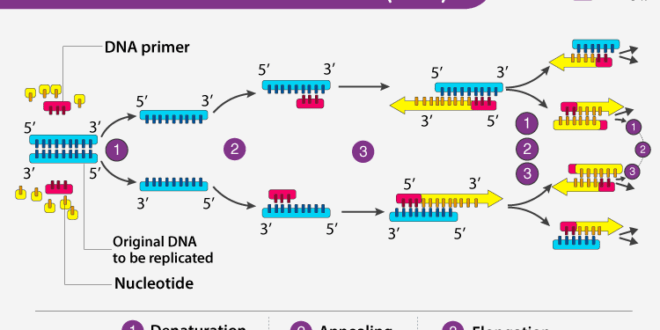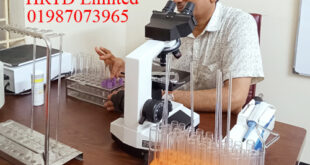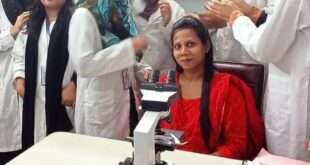Polymerase Chain Reaction (PCR) Details
Polymerase Chain Reaction (PCR). Mobile Phone 01797-522136. Polymerase Chain Reaction (PCR) is a revolutionary molecular biology technique used to amplify specific DNA sequences. Here are some important points about PCR:
Principle:
Polymerase Chain Reaction involves three main steps: Denaturation, Annealing, and Extension. During denaturation, the DNA double helix is separated into single strands by heating. In the annealing step, primers (short DNA sequences) bind to complementary sequences on the single-stranded DNA. Extension occurs when DNA polymerase synthesizes new DNA strands complementary to the target sequence using the primers as a starting point.
Applications:
PCR has numerous applications in research, diagnostics, forensic science, and biotechnology. It is used to detect and identify pathogens, study gene expression, sequence DNA, and analyze genetic mutations, among other things.
Types of PCR:
- Standard Polymerase Chain Reaction: Traditional Polymerase Chain Reaction is used for amplification of DNA fragments.
- Real-time Polymerase Chain Reaction (qPCR): Allows for the quantification of DNA during the PCR process, providing real-time data on DNA amplification.
- Reverse Transcription Polymerase Chain Reaction (RT-PCR): Amplifies RNA by first converting it into complementary DNA (cDNA) using reverse transcriptase enzyme.
- Nested PCR: Involves two rounds of PCR amplification, increasing specificity and sensitivity.
- Multiplex Polymerase Chain Reaction: Amplifies multiple DNA sequences in a single reaction, allowing for the detection of multiple targets simultaneously.
- Digital PCR: Precisely quantifies DNA by partitioning the sample into many individual Polymerase Chain Reaction reactions, enabling absolute quantification without the need for standard curves.
Components
Polymerase Chain Reaction requires a DNA template, primers, DNA polymerase (usually Taq polymerase), nucleotides (dNTPs), and buffer solution. The reaction is carried out in a thermal cycler, which can precisely control temperature changes for each step of the Polymerase Chain Reaction cycle.

How Polymerase Chain Reaction (PCR) work?
Polymerase Chain Reaction works by amplifying a specific segment of DNA multiple times, creating millions of copies of the target sequence. This process is crucial in various scientific fields, including molecular biology, genetics, and medical diagnostics.
Here’s a simplified breakdown of how PCR works:
Denaturation:
The first step involves heating the DNA sample to around 94-98°C. This high temperature causes the double-stranded DNA to separate into two single strands, effectively “melting” the DNA and making it accessible for replication.
Annealing:
After denaturation, the temperature is lowered to around 50-65°C. At this temperature, short DNA sequences called primers bind to complementary sequences at each end of the target DNA region. These primers provide a starting point for DNA synthesis.
Extension:
The temperature is then raised to around 72°C, the optimal temperature for the DNA polymerase enzyme. This enzyme begins to synthesize new DNA strands by adding nucleotides complementary to the template strand. As the DNA polymerase moves along the template strand, it extends the primers, creating new double-stranded DNA molecules.
Cycle Repetition:
The entire process of denaturation, annealing, and extension is repeated multiple times (usually 20-40 cycles) in a Polymerase Chain Reaction machine. Each cycle doubles the amount of target DNA, resulting in exponential amplification.
By the end of the Polymerase Chain Reaction reaction, millions to billions of copies of the target DNA sequence are produced, even from a minute starting amount. This amplified DNA can then be analyzed and used for various applications, such as genetic testing, disease diagnosis, forensic analysis, and DNA sequencing.
Advantages:
- Rapid amplification of DNA.
- High specificity and sensitivity.
- Can amplify minute amounts of DNA.
- Versatile and adaptable to various applications.
Limitations:
- Susceptible to contamination, leading to false results.
- Requires careful primer design to ensure specificity.
- Cannot amplify highly degraded or damaged DNA.
PCR has revolutionized molecular biology and has become an indispensable tool in various fields, contributing significantly to advancements in research, medicine, and biotechnology.

 Pathology Training Institute in Bangladesh Best Pathology Training Institute in Bangladesh
Pathology Training Institute in Bangladesh Best Pathology Training Institute in Bangladesh




